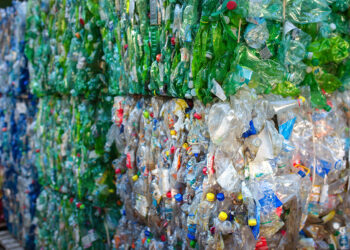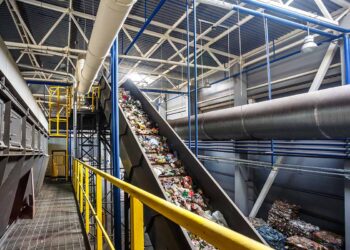A bill that would set up an extended producer responsibility program for packaging is sitting on the desk of Maryland’s governor after clearing both legislative chambers Monday evening. If it’s signed, Maryland would become the sixth U.S. state to enact such a law.
SB 901 would direct a producer responsibility organization to set goals for post-consumer recycled content levels, recyclability rates, recycling rates, reuse rates, source reduction levels, composting rates and contamination reduction.
It follows an attempt to pass packaging EPR in 2023, which instead resulted in a needs assessment involving producer responsibility organization Circular Action Alliance. That recently submitted assessment found that EPR for paper and plastic packaging could increase the state’s annual collection from 984,400 tons to 1.5 million tons.
Under SB 901, the PRO would have to submit a five-year producer responsibility plan by July 1, 2028, and carry out a statewide needs assessment once every decade.
The PRO would also set fees that would allow for improvements to the system and reimbursements to local governments for up to half the cost of collection, along with the full cost of transportation and processing.
Fees would have to include eco-modulation factors, according to the bill, and reimbursement rates would have to account for population size, distance to MRFs and other socioeconomic or geographic factors the state chooses.
It covers packaging, beverage containers and organics and calls for reimbursement of at least 50% of the cost per ton by July 1, 2028, rising to 75% in 2029 and 90% in 2030.
The bill passed out of the Senate on March 17 with a vote of 35-12 and out of the House on April 7 on a vote of 101-35 with amendments regarding harmonization if the state also sets up a beverage container deposit return system. Gov. Wes Moore has 30 days to sign the bill once it’s presented to him.
The American Forest & Paper Association has opposed the bill, as it opposes all EPR bills that include paper. In a statement, the organization said “lawmakers are rushing to consider” the “misguided” bill.
“The EPR legislation has wide-ranging, negative impacts for the paper industry,” the statement added. “In fact, legislators in the Maryland House of Delegates seemed aware of the risks SB 901 has for the paper industry. They initially included a provision in the bill to ensure paper’s continued recycling success, only to remove it at the last minute.”
Chaz Miller, member of the Maryland Recycling Network board, said the organization has been working on packaging EPR in the state for several years, starting with the first attempt at passing the legislation.
“The first bill was 11 pages, and while you could figure out the intent, the language just wasn’t there,” he said, adding that this iteration has language that is specifically tailored for Maryland.
And while Miller said SB 901 is a “much better bill than, I think, any of the bills that passed in many other states,” he’s worried about the growing partisan nature of EPR. SB 901 did not get any Republican votes in the House, he said, and only on in the Senate. It’s “very worrisome for EPR if it becomes one party’s program.”


























